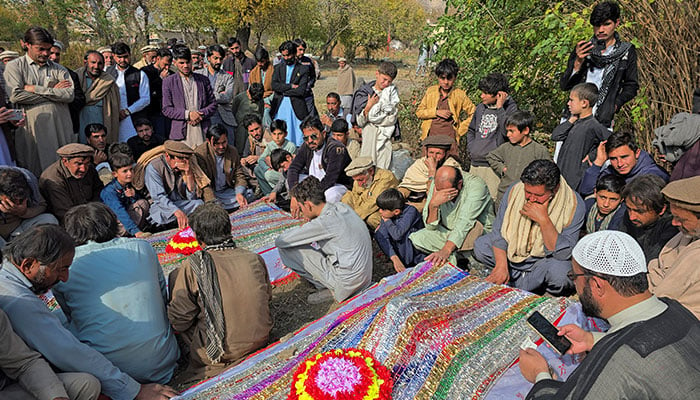Kurram Ceasefire
On Sunday, the two warring factions in Khyber Pakhtunkhwa’s Kurram district reached an agreement to implement a seven-day ceasefire after several days of deadly clashes that have claimed the lives of at least 76 people and left many others wounded.
The violence, which escalated in recent days, began when gunmen attacked civilian convoys on Thursday, resulting in the deaths of 49 individuals.
The attack sparked retaliatory actions, leading to intense clashes between armed groups from both communities, with the fighting quickly spiraling into a full-scale conflict.
The conflict in Kurram is rooted in a longstanding tribal and sectarian rivalry, primarily centered around a land dispute near the Afghanistan border.
The area has seen numerous such conflicts in the past, but the latest bout of violence has been particularly devastating.
In response to the crisis, a government delegation led by Muhammad Ali Saif, an advisor to the Khyber Pakhtunkhwa Chief Minister, was dispatched to Kurram’s Parachinar to negotiate a ceasefire.
The delegation engaged with Sunni and Shia community leaders, working to broker peace and stop the violence.
Saif confirmed that the efforts led to a successful seven-day ceasefire agreement, adding that the two sides had also agreed to exchange captives and return the bodies of those killed during the clashes.
The government’s efforts are focused on reducing tensions and facilitating further dialogue between the conflicting parties.
Saif emphasized that the provincial government was committed to resolving all issues peacefully and had received positive responses from local leaders.
The violence since Thursday’s attacks has seen a steady rise in casualties, with 76 confirmed dead and dozens more injured. As a result, a communication blackout has been imposed in the region, and authorities have expressed concern that the death toll could rise further due to limited access to information.
On Saturday, a government helicopter carrying the delegation was shot at, though it managed to land safely.
In addition to the clashes, many homes have been evacuated, and businesses, markets, and schools remain closed.
The unrest has led to further protests, with demonstrators in Hangu blocking the road to Kohat, demanding a military operation against banned organizations.
Meanwhile, the police reported continued clashes in the Lower Kurram area, specifically near the village of Ali Zai, where armed militias took control of several villages after heavy fighting.
The situation remains tense, but the ceasefire offers a temporary reprieve as the government works to stabilize the region.
I am a dynamic professional, specializing in Peace and Conflict Studies, Conflict Management and Resolution, and International Relations. My expertise is particularly focused on South Asian Conflicts and the intricacies of the Indian Ocean and Asia Pacific Politics. With my skills as a Content Writer, I serve as a bridge between academia and the public, translating complex global issues into accessible narratives. My passion for fostering understanding and cooperation on the national and international stage drives me to make meaningful contributions to peace and global discourse.










